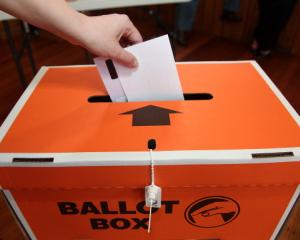One of the writer Graham Greene's novels, The Comedians, published in 1966, was set in a place Greene had visited several times, the Haiti of "Papa Doc" Duvalier, who ruled the country from 1957 to 1971.
Greene's story of corruption concerns, in part, both the dictator and his infamous secret police, the Tontons Macoute.
And, as Greene later related, Papa Doc was so incensed by it that he had a counter-publication distributed in which he described the author in highly unflattering terms.
It is to be wondered whether Duvalier's son, Jean-Claude - "Baby Doc" - has read The Comedians; had he done so he might have come to the line: "There is a point of no return, unremarked at the time, in most lives."
Duvalier is soon to discover, it seems, whether he has reached that point of no return.
No-one can say for sure, but his appearance in Port-au-Prince nearly 25 years after being forced into exile, was as surprising to the Haitians as it was to the rest of the world; the interim government promptly had him arrested and it appears that he has now been charged with theft and misappropriation of funds during his 1971-86 rule.
He is also being sued for torture and other crimes against humanity.
Haiti is the poorest country in the Western world and has been virtually since the successful revolution by slaves, when it was a colony of France, in the early 1800s.
Its modern history may be judged to have begun in 1915, when it was occupied by the United States to counter German influence in the Caribbean.
The Americans held the country until 1934, a period of political stability but with little beneficial influence on the economic state of its people.
Greene first visited in the mid-1950s when Western tourists were still calling, though the people lived in extreme poverty.
Papa Doc Duvalier became president in 1957 in a rigged poll and rapidly imposed a dictatorship, declaring himself "president for life".
Jean-Claude "inherited" his father's position but could not maintain his control, and when the United States withdrew political and economic support in 1986 he fled to France.
Since then, only the government of Father Jean-Bertrand Aristide, which lasted just seven months, has tried to implement the kind of changes designed to lift the status of the majority of Haiti's population.
Even the most recent elections, held last November and highly questionable, failed to produce certainty, with no candidate reaching even 32% of the popular vote.
The devastating earthquake a year ago has left the Administration and economy in tatters.
Two-thirds of all Haitians depend on subsistence agriculture; its overseas debts have been forgiven by some of its lenders, and although in the aftermath of the earthquake some $US500 billion in aid was promised, just a fraction has appeared.
The country relies almost entirely on international economic aid.
Baby Doc's return was, according to some of his closest supporters, intended only to be a three-day visit to view the effects of the earthquake - curious timing on that basis alone, but which might have had much more to do with the unresolved political crisis following the election.
He cannot have been unaware of President Rene Duval's earlier public statements that if he ever returned he would face justice for the murders of thousands of Haitians under his regime, and for the theft of millions from the exchequer.
Now he has been arrested, his passport confiscated, he is likely to face trial on charges of corruption and embezzlement, at least, and the Haitian state is trying to get returned $US5.7 million held in Duvalier's Swiss bank account - said to be all that is left of what he stole.
The international chorus for Duvalier to now also be tried for human rights abuses that took place under his regime - they include murder, torture, rape, and enforced "disappearances" - is growing louder.
Perhaps of more urgent concern is whether Duvalier's appearance will trigger a descent into even greater political chaos: he is not the only former Haitian leader living in exile.
The over-thrown yet electorally popular Aristide may now attempt to return from his home in South Africa - his party remains the best-supported political organisation in Haiti but its candidates were prevented from contesting the election.
The role of the United States and France in these events, if any, has yet to emerge, although the rumours are widespread given the permanent absence of respect by the international community for Haiti and its grievously poor people.
Certainly, as some international commentators have already noted, the return of Duvalier means, once again, the future of Haiti and its people is at the mercy of others.












